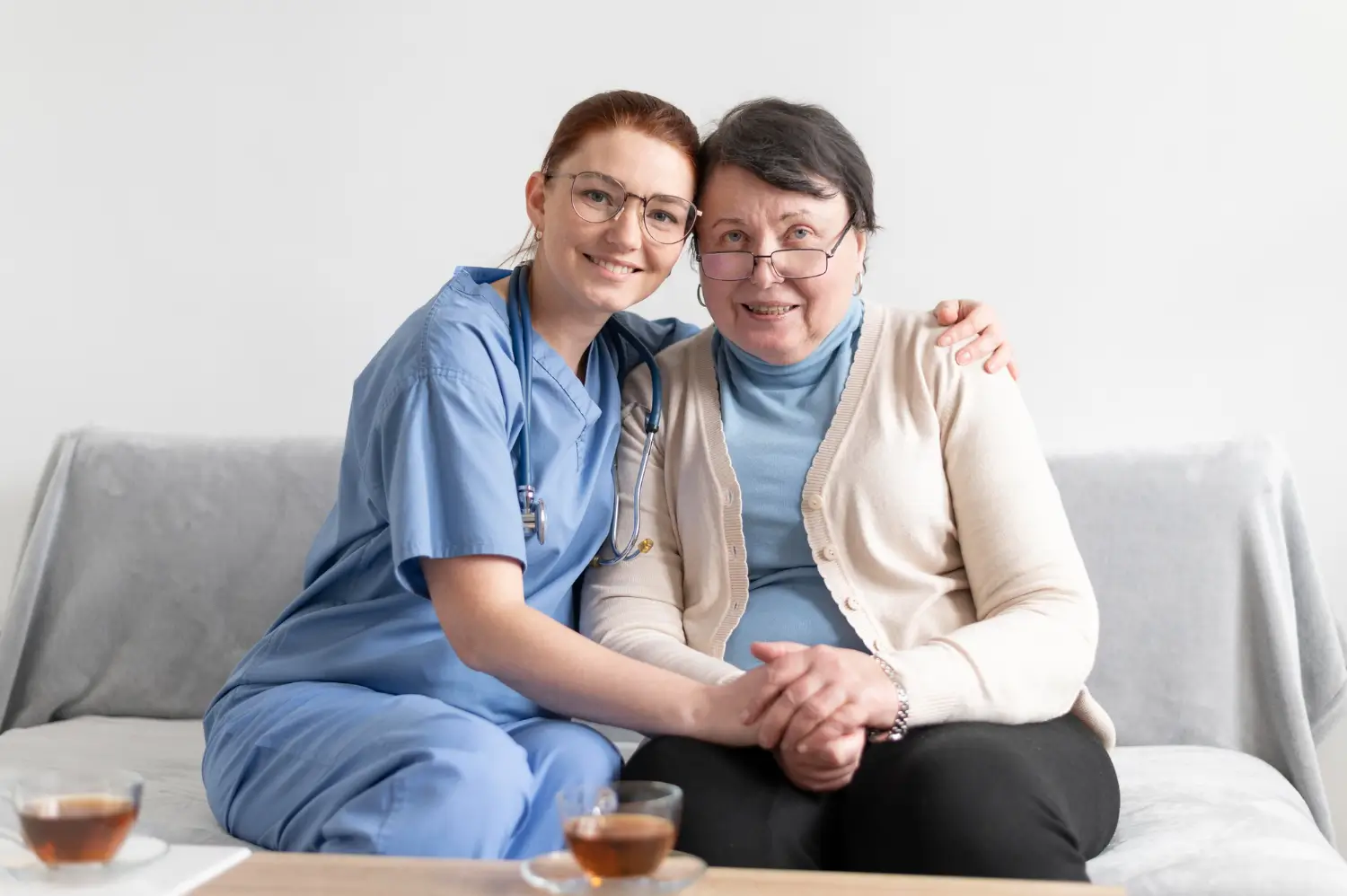Think back to 1981—just over 6 million people in England were aged 65 or older. Fast-forward to today, and that number has surged by more than 3.5 million, a 52% increase—a clear signal that the UK is greying fast. Senior Carers bridge the gap between heartfelt personal care and leadership in social care settings—and the Level 3 Diploma in Health and Social Care is now essential for stepping into that role.
A Senior Carer guide care staff, coordinate with healthcare professionals, and ensure care plans are delivered to the highest standards. In doing so, they’re helping to reshape the profession—bringing a more skilled, person-centred, and proactive approach that lifts both the quality of care and the confidence of the teams delivering it.
This guide will walk you through the essential steps to become a Senior Carer. We’ll explain the importance of the Level 3 Diploma, what the role entails, and how to successfully transition into this rewarding leadership position.
What is a senior care worker
A Senior Carer is someone who takes on more responsibility than a Care Assistant. They help with day-to-day care but also lead a team of junior carers. Their main job is to ensure that residents receive the best possible care in a safe, comfortable environment.
Work Settings:
- Typically found in care homes, hospitals, and private care settings.
- They oversee residents’ well-being and make sure care plans are followed.
- Senior Carers often communicate with families about the care and progress of their loved ones.
Skills and Personal Qualities Needed:
- Compassion and Empathy: Senior Carers need to be understanding and supportive of residents’ needs.
- Leadership: The ability to guide and mentor junior staff is crucial.
- Organisational Skills: They must manage care plans, schedules, and ensure everything runs smoothly.
- Communication: Clear communication with both residents and staff is key to providing quality care.
- Patience and Resilience: Working with vulnerable people requires patience and the ability to stay calm in tough situations.
Why Choose a Career as a Senior Carer?
Becoming a Senior Carer isn’t just about a job—it’s a chance to make a real difference. With growing demand in the healthcare sector, this role offers not only personal satisfaction but also opportunities for career growth. Let’s dive into why this career might be the perfect fit for you.
Make a Real Difference:
One of the most rewarding aspects of being a Senior Carer is knowing you’re making a difference in people’s lives. You help improve the quality of life for vulnerable individuals, offering them comfort, care, and companionship. It’s a career that brings a sense of purpose every day.
Job Security and Demand:
With an ageing population in the UK, the demand for carers, especially Senior Carers, is growing. This means job security and opportunities for advancement in the healthcare sector. As the need for senior care continues to rise, your skills will always be in demand.
Career Growth and Development:
Becoming a Senior Carer opens up numerous career progression opportunities. You can move into more senior roles, such as Care Manager or Nursing positions. The healthcare sector also offers options for further training and specialisation, so you can keep growing professionally.
Competitive Salary and Benefits:
Senior Carers typically earn more than entry-level carers due to their leadership and responsibility. Along with a good salary, there are often additional benefits such as flexible working hours and healthcare packages. This makes it a financially rewarding career as well as a fulfilling one.
Understanding the Level 3 Diploma in Health and Social Care

The Level 3 Diploma is designed to provide you with a strong foundation in health and social care. It focuses on developing both practical and theoretical knowledge required to lead care teams, manage services, and support vulnerable individuals. The diploma ensures you understand the core aspects of care delivery, including quality standards, legal responsibilities, and leadership skills.
Units/Modules Typically Included
The diploma includes a variety of units to prepare you for the role of a Senior Carer. Some typical modules include:
- Leadership and management skills: Teaching you how to supervise, motivate, and manage a care team.
- Safeguarding: Ensuring the safety and well-being of individuals in your care, covering the importance of protecting vulnerable people.
- Care planning: How to develop, implement, and review personalised care plans for individuals, ensuring their needs are met.
Difference Between Level 2 and Level 3
The main difference between Level 2 and Level 3 lies in the level of responsibility and leadership.
- Level 2 is focused on providing direct care and support, while
- Level 3 includes leadership, team management, and supervisory skills.
Level 3 also goes deeper into topics like safeguarding, care planning, and legislation, equipping you for more senior roles.
How to Get Your Level 3 Diploma in Health and Social Care
If you’re looking to become a Senior Carer, earning your Level 3 Diploma in Health and Social Care is an essential step. But how do you go about getting this qualification? In this section, we’ll guide you through the process—from choosing the right training provider to understanding course duration, assessments, and funding options.
Choosing the Right Training Provider
The first step is choosing the right training provider for your Level 3 Diploma. You can study at a college, take an online course, or even pursue an employer-sponsored route. Colleges offer classroom-based learning, while online courses give you flexibility to study at your own pace. Employer-sponsored programs may also provide hands-on experience, with training tailored to your workplace needs.
If you’re looking for a flexible option, the Health and Social Care Level 3 Diploma from HF Online is a great choice. Their online course offers flexibility and comprehensive learning to help you advance in the care sector.
Duration of the Course
The duration of the Level 3 Diploma can vary depending on how you study. Typically, the course takes around 6 to 18 months if you’re studying full-time or part-time. If you’re working while studying, the course may take longer, but the flexibility helps you balance both work and learning.
Assessment Methods
The Level 3 Diploma uses a variety of assessment methods. You’ll likely complete coursework and may also be assessed through workplace observations. This means you’ll apply what you learn in real-life care settings, making the qualification practical and hands-on. These assessments help ensure you’re ready to lead care teams effectively.
Costs and Funding Options
The cost of the Level 3 Diploma can vary depending on your provider and study method. However, there are several funding options available. You may be able to apply for an apprenticeship, where your employer covers the cost. Government grants and employer support can also help reduce the financial burden, making it more affordable for you to get qualified.
Steps to Becoming a Senior Carer

Becoming a Senior Carer requires a combination of experience, training, leadership, and preparation. By following these clear steps, you can move forward in your career and take on a role that allows you to lead a team while providing top-quality care.
1. Gain Initial Care Experience
To start, you need to gain practical experience in the care sector. Begin by working as a Care Assistant or Support Worker. These roles will help you understand the daily care needs of individuals and build essential skills in communication and compassion.
2. Complete Relevant Training
Once you’ve gained experience, it’s time to move on to relevant training. If you’re new to the field, begin with a Level 2 Diploma in Health and Social Care. Afterward, complete your Level 3 Diploma to develop the skills required for more advanced responsibilities, like leadership and care management.
3. Develop Leadership Skills
As you progress, it’s important to start developing leadership skills. Look for opportunities to supervise or mentor junior staff. Gaining experience in delegating tasks and managing care routines will help you grow into a leadership role.
4. Apply for Senior Carer Roles
Once you’re qualified and experienced, start applying for Senior Carer positions. Make sure your CV and cover letter highlight your relevant experience, leadership skills, and qualifications. Be clear about your ability to lead teams and provide high-quality care.
5. Prepare for Interviews
When you land an interview, preparation is key. Practice answers to common questions like, “How do you manage a team?” or “What challenges have you overcome in care?” Focus on showcasing your leadership abilities, experience, and dedication to providing excellent care.
Tips for Success in a Senior Carer Role
As a Senior Carer, your role goes beyond providing care—it’s about leadership, support, and creating a positive environment. Here are some practical tips to help you succeed and grow in your role.
1. Build Strong Relationships
One of the most important aspects of being a Senior Carer is building trust with both the residents and your team. Take the time to connect with each person you care for. Similarly, support your team by creating an open, friendly work environment where communication is key.
2. Lead by Example
Your team looks up to you for guidance. Be a role model by showing respect, professionalism, and compassion in everything you do. When you lead by example, you inspire others to do the same, which creates a positive, productive atmosphere.
3. Stay Organized
As a Senior Carer, you’ll have many responsibilities, from managing care plans to supervising staff. Staying organized is essential. Use checklists or care management software to keep track of tasks and ensure everything runs smoothly.
4. Keep Learning
The care sector is always evolving, so continuous learning is crucial. Stay updated on new care techniques, policies, and technologies. Attend training sessions or seek out further qualifications to continue improving your skills.
5. Practice Self-Care
Caring for others can be physically and emotionally demanding. Don’t forget to take care of yourself. Make time for rest, hobbies, and spending time with loved ones to recharge and avoid burnout.
Conclusion
Becoming a Senior Carer with a Level 3 Diploma is not only a fulfilling career choice but also an opportunity to truly make a difference in people’s lives. With the right mix of experience, training, and leadership skills, you can elevate your career and create a positive impact on both residents and your team.
Now that you know the steps and benefits, it’s time to take the next step toward your future as a Senior Carer. The journey is within your reach—start today and unlock a rewarding career in care!
Health and Social Care Level 3 Diploma
Frequently Asked Questions
To start your journey as a carer, you don’t need a specific qualification at first. Many begin as Care Assistants or Support Workers, gaining hands-on experience by providing personal care to individuals. You can apply for entry-level roles in care homes, hospitals, or home care services. Once you have some experience, you can progress to further qualifications, like the Level 3 Diploma, which opens doors to more advanced roles, such as a Senior Carer.
Becoming a Senior Carer typically takes 2-3 years. This includes gaining initial experience as a Care Assistant or Support Worker and completing the Level 3 Diploma in Health and Social Care. The course itself can take around 12-18 months, depending on whether you study full-time, part-time, or via an employer-sponsored route.
A Senior Carer in the UK typically earns between £20,000 and £30,000 per year. However, this can vary depending on factors such as location, the type of care setting, and the level of responsibility. Some Senior Carers may also receive additional benefits, such as flexible hours or healthcare packages.
The key difference between a Carer and a Senior Carer lies in responsibility and leadership. A Carer focuses primarily on providing personal care to individuals, such as helping with bathing, dressing, and feeding. In contrast, a Senior Carer takes on a supervisory role, managing care teams, overseeing care plans, and ensuring that high standards of care are maintained across the team.
Senior Carers need a mix of practical care skills and leadership qualities. These include:
- Leadership and supervision: Ability to guide and mentor junior staff.
- Communication: Clear and empathetic communication with both residents and staff.
- Organisational skills: Managing care plans, schedules, and tasks effectively.
- Problem-solving: Handling difficult situations and finding solutions quickly.
- Compassion and empathy: Essential for providing high-quality care to vulnerable individuals.
To become a Senior Carer, you typically need a Level 3 Diploma in Health and Social Care. Before this, you may need to complete a Level 2 Diploma if you’re new to the field. You’ll also need some practical care experience and leadership skills, which you can develop while working in care roles like Care Assistant or Support Worker.
While it’s possible to progress to a Senior Carer role with experience and on-the-job training, having a Level 3 Diploma is highly recommended and often required. This qualification demonstrates your advanced knowledge and ability to manage care teams, handle responsibilities, and ensure the delivery of high-quality care.
The Level 3 Diploma in Health and Social Care is a nationally recognised qualification designed to provide you with the skills needed to work as a Senior Carer. It covers topics such as leadership, care planning, safeguarding, and team management, preparing you to take on a more senior, responsible role within a care setting.
There are several funding options available to help you pay for your Level 3 Diploma. You can apply for an apprenticeship, where the cost is often covered by your employer. There are also government grants and financial support available for eligible students. Some employers may also sponsor your qualification if you’re already working in a care role.
After becoming a Senior Carer, you can progress to roles such as Care Manager, Nursing roles, or Clinical Care Lead. There are also opportunities to specialise in areas like dementia care, palliative care, or learning disabilities. The healthcare sector offers a wide range of career advancement options, so the possibilities are endless.
Table of Contents




















